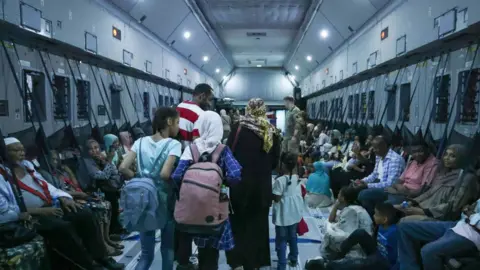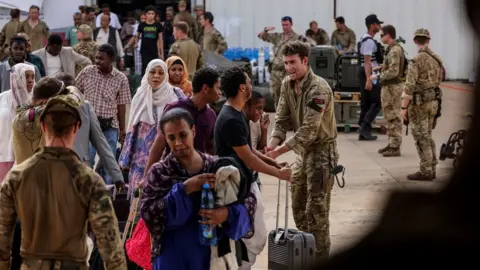Sudan crisis: Last UK evacuation flight leaves rescue effort ends
 UK Ministry of Defence
UK Ministry of DefenceAn operation to evacuate people from Sudan has been "extremely successful", a government minister has said, as the UK ended its evacuation operation.
The Foreign Office said the last flight left the capital, Khartoum, at 22:00 local time (21:00 BST) on Saturday.
"We can't stay there forever in such dangerous circumstances," said Foreign Office minister Andrew Mitchell.
A 72-hour ceasefire broke down on Saturday, with armed factions stepping up their battle for the capital.
Bombers and heavy artillery are targeting parts of Khartoum, while the Sudanese army claimed it was attacking the city in all directions to try to drive out the paramilitary Rapid Support Forces.
Tens of thousands of people have fled the country since fighting engulfed Sudan two weeks ago.
The death toll is thought to be much higher than the most recent official figure of 459, and the United Nations fears hundreds of thousands could be displaced if the conflict continues.
The former prime minister of Sudan has warned that the conflict could become worse than those in Syria and Libya.
Other countries have been frantically evacuating their citizens, while some have fled via unofficial routes by boat and bus.
On Saturday evening the US government said it had completed the first rescue of its citizens. US nationals and permanent residents had been taken by convoy to Port Sudan and were crossing the Red Sea by boat to Jeddah in Saudi Arabia, it said.
The UK government said 1,888 people had been evacuated on 21 flights, and it is "no longer running evacuation flights".
The UK government, which began evacuations last Tuesday, had faced criticism for not reacting quickly enough to help its citizens after it began its airlift after other European countries had rescued hundreds.
It also faced pressure for only evacuating British nationals and excluding NHS doctors - but later made a U-turn and decided to allow them to board flights.
 Reuters
ReutersLast weekend, special forces troops were sent to evacuate UK diplomats from Khartoum after fighting broke out around the embassy, but it wasn't until a few days later that British passport holders would be rescued.
Speaking to the BBC in Nairobi, Mr Mitchell said it was right that the evacuation flights were ending.
"I don't think there's a single Brit in Khartoum who won't know about the evacuation and the flow of people who've been coming to the airport indicate that that is correct," he told the BBC.
Referencing a Turkish evacuation plane that was fired at when coming into land, Mr Mitchell described the situation at the Wadi Seidna airfield as "extremely dangerous".
He said the UK government was "looking at every single option to help British citizens who are caught up in this terrible crisis".
He added that he was concerned that the situation could become "incredibly serious" unless there was a permanent ceasefire.
"The whole international system is looking at ways of stopping this fighting" he said, "which after all is two generals slugging it out for power".
A Foreign Office spokesperson said the UK's Sudan evacuation was "the largest of any western country".
Millions of people remain trapped in Khartoum, where there are shortages of food, water and fuel.
 UK Ministry of Defence
UK Ministry of DefenceMore than 20 NHS medics were initially told they could not board flights because they were not British nationals, despite having UK work permits.
A change of heart came after the plight of Sudanese doctor Dr Abdulrahman Babiker came to light. He was in Sudan visiting relatives for Eid when the fighting broke out.
He was initially refused a place on a British evacuation flight but after media coverage and contacting his MP, the criteria was widened and he was allowed to join. He landed in the UK on Saturday afternoon.
